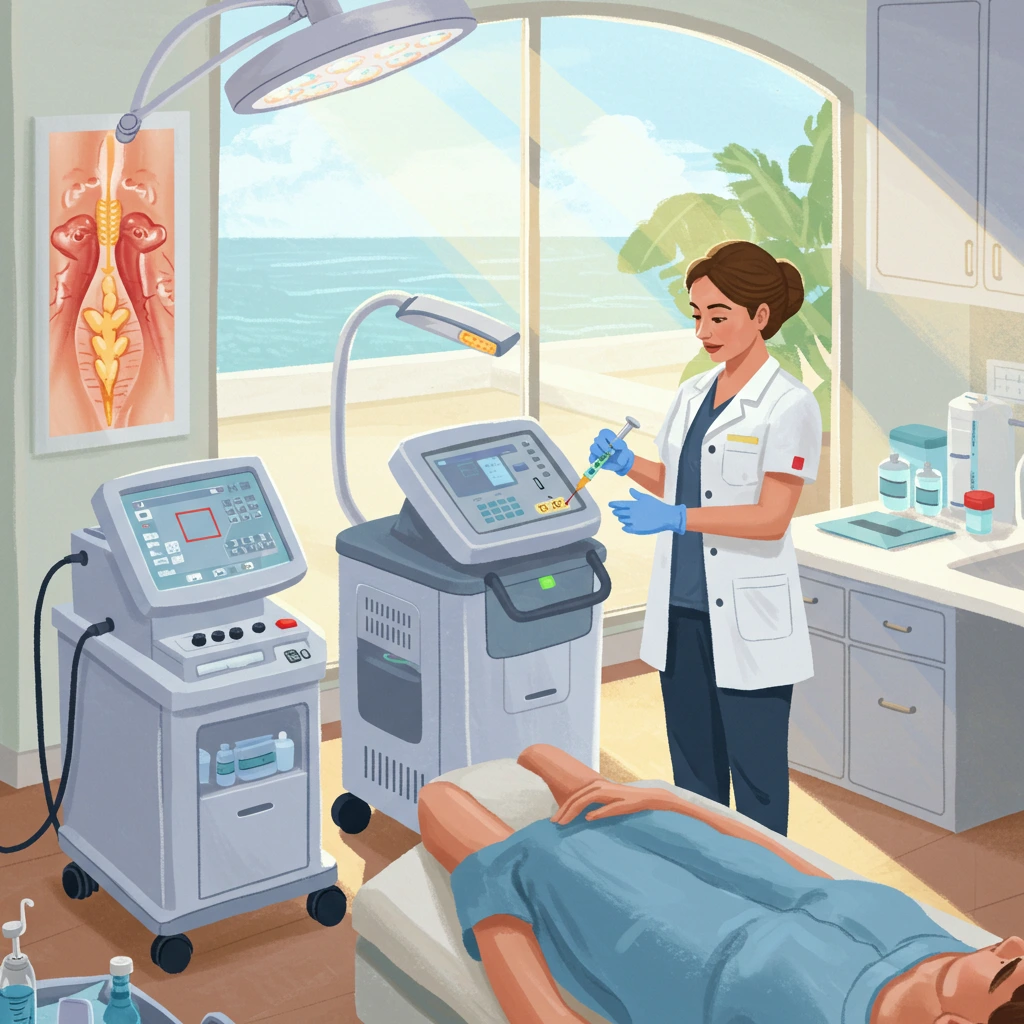Unraveling the Mysteries: 21 Most Common Questions About Stem Cells
Stem cells have emerged as a promising field in regenerative medicine, offering hope for a wide range of conditions. If you’re in Fort Lauderdale or anywhere in South Florida, you might be curious about these remarkable cells. Let’s address some common questions to shed light on the topic.
How are stem cells used in regenerative medicine? Stem cells can be harnessed to stimulate tissue repair and regeneration, offering new possibilities for treating diseases and injuries. They can be sourced from different places, such as bone marrow, adipose tissue, or umbilical cord blood.
Where can I find stem cell therapy in Fort Lauderdale or South Florida? Fort Lauderdale boasts a thriving medical community, including reputable clinics offering stem cell therapy like IROSM. It’s crucial to seek treatment from certified and experienced providers who follow ethical guidelines and adhere to rigorous safety standards.
In conclusion, stem cells hold tremendous promise in the field of regenerative medicine. They offer exciting prospects for addressing various health conditions and promoting tissue repair. If you’re interested in exploring stem cell therapy in Fort Lauderdale or South Florida make sure to call the Institute of Regenerative Orthopedics & Sports Medicine. We have the best doctor and medical staff to help you. As always consult with trusted healthcare professionals to learn more about its potential benefits for your specific needs. Finally, we hope you enjoy common questions about stem cells.
Common Questions About Stem Cells:
Q: Are stem cell therapies FDA-approved?
A: The approval status of stem cell therapies can vary depending on the country and the specific therapy in question. In the United States, for example, the Food and Drug Administration (FDA) regulates stem cell therapies and classifies them as either approved treatments or investigational therapies being evaluated in clinical trials. It is important to consult with medical professionals and reputable clinics to understand the regulatory status and legitimacy of stem cell therapies in your specific region. In addition, this is one of the most common questions about stem cells.
Q: What are the potential risks associated with stem cell therapy?
A: While stem cell therapy has shown promise, it is important to consider potential risks and complications. These can include infection, allergic reactions, immune rejection, and the rare possibility of tumor formation. The risk profile may vary depending on factors such as the type of stem cells used, the delivery method, and the individual patient’s circumstances. Thorough evaluation, proper screening, and adherence to established guidelines can help mitigate these risks.
Q: Can stem cell therapy guarantee a cure for my condition?
A: Stem cell therapy is not a guaranteed cure for all medical conditions. The effectiveness of treatment can vary depending on numerous factors, including the specific condition being treated, the stage and severity of the condition, and individual variations in response to therapy. Stem cell therapy offers the potential for significant improvements and can enhance the body’s natural healing processes, but it is important to have realistic expectations and discuss potential outcomes with your healthcare provider. Lastly, we believe this to be a very common questions about stem cells.
Q: How long does it take to see results from stem cell therapy?
A: The timeline for seeing results from stem cell therapy can vary depending on the condition being treated and the individual patient’s response to the treatment. Some patients may experience improvements shortly after treatment, while others may require a longer period for the effects to become apparent. It is important to follow the recommended treatment plan, attend follow-up appointments, and communicate regularly with your healthcare provider to monitor progress.
Q: Are there any ethical concerns associated with stem cell therapy?
A: Ethical considerations surrounding stem cell therapy primarily revolve around the use of embryonic stem cells, which are derived from human embryos. Due to the ethical concerns associated with the destruction of embryos, alternative sources of stem cells, such as adult stem cells and induced pluripotent stem cells, have gained prominence. These alternative sources provide ethically viable options for therapeutic use. Adherence to ethical guidelines and regulations is essential to ensure the responsible and ethical practice of stem cell therapy.
Q: What is the future outlook for stem cell therapy?
A: The field of stem cell therapy continues to evolve rapidly, with ongoing research and advancements shaping its future. Scientists are exploring emerging applications, such as tissue engineering, gene editing technologies, and personalized medicine approaches. Ongoing clinical trials and studies are providing valuable insights into the optimal use of stem cells and expanding their potential applications. Continued research, regulatory oversight, and collaboration among experts worldwide hold the promise of unlocking even greater potential for stem cell therapy in the future.
Q: Can stem cell therapy be combined with other treatments?
A: Yes, in many cases, stem cell therapy can be combined with other treatments to enhance its effectiveness. For example, in orthopedics, stem cell therapy is often used in conjunction with physical therapy and rehabilitation exercises to promote tissue healing and strengthen the affected area. In some cases, stem cell therapy may also be used alongside traditional treatments such as medication or surgery. The specific combination of treatments will depend on the individual patient’s condition and the recommendations of their healthcare provider.
Q: How much does stem cell therapy cost?
A: The cost of stem cell therapy can vary significantly depending on various factors, including the type of stem cells used, the treatment protocol, the clinic or healthcare provider, and the location. Stem cell therapy is often considered an elective procedure and may not be covered by insurance, resulting in out-of-pocket expenses for patients. It is important to consult with healthcare providers and clinics to understand the cost structure, potential financing options, and any associated fees for consultations, follow-up appointments, and additional services.
Q: Is stem cell therapy widely available?
A: The availability of stem cell therapy can vary depending on the country and the specific regulations in place. In some countries, such as the United States, stem cell therapy is available, but strict regulations govern its use and commercialization. It is essential to seek treatment from reputable clinics or healthcare providers that adhere to established guidelines and have a track record of safety and efficacy. Researching the local regulations, consulting with medical professionals, and exploring reputable healthcare facilities can help determine the availability of stem cell therapy in a particular region.
Q: Can I participate in a stem cell clinical trial?
A: Participating in a stem cell clinical trial may be an option for some patients, depending on their specific condition and the ongoing research studies in their area. Clinical trials play a crucial role in advancing medical knowledge and evaluating the safety and efficacy of new treatments. If you are interested in participating in a clinical trial, it is recommended to discuss this with your healthcare provider, who can help determine if you meet the eligibility criteria for these treatments.
Q: What are the potential risks and side effects of stem cell therapy?
A: Like any medical procedure, stem cell therapy carries some potential risks and side effects. While stem cell therapy is generally considered safe, complications can occur. These may include infection, bleeding, tissue damage, and an immune reaction to the transplanted cells. There is also a small risk of the transplanted cells not functioning as intended or developing into unintended cell types. It is important to discuss the potential risks and side effects with your healthcare provider before undergoing any stem cell therapy to ensure you have a clear understanding of what to expect.
Q: What is the future outlook for stem cell therapy?
A: The field of stem cell therapy holds great promise for the future of medicine. Researchers and scientists continue to explore new ways to utilize stem cells for a wide range of conditions. Advancements in stem cell research, such as the development of induced pluripotent stem cells (iPSCs) and gene editing techniques, have opened up new possibilities for personalized and targeted therapies. However, further research is needed to fully understand the potential of stem cells and optimize their use in clinical settings. As ongoing studies and clinical trials provide more data, it is expected that the applications and effectiveness of stem cell therapy will continue to expand.
Q: Are there any ethical considerations associated with stem cell therapy?
A: The use of stem cells in therapy has raised ethical questions and debates due to different sources of stem cells and their potential implications. Embryonic stem cells, which are derived from human embryos, have been a subject of ethical controversy. However, alternative sources such as adult stem cells and induced pluripotent stem cells (iPSCs) have been developed, which do not involve the destruction of embryos. It is important for researchers, clinicians, and policymakers to carefully consider ethical concerns and adhere to established guidelines and regulations when conducting stem cell research and providing therapies.
Q: How can I stay informed about developments in stem cell therapy?
A: Staying informed about developments in stem cell therapy can be achieved through various channels. Following reputable scientific and medical journals, attending conferences and seminars. Consulting with healthcare professionals are effective ways to stay updated. Additionally, reputable organizations and institutions focused on stem cell research, such as the International Society for Stem Cell Research (ISSCR). This organization provide information on the latest advancements and breakthroughs in the field. However, it is important to critically evaluate information and rely on credible sources to ensure accurate and reliable knowledge.
Remember, the field of stem cell therapy is rapidly evolving, and new discoveries are being made regularly. It is crucial to consult with healthcare professionals who specialize in stem cell therapy. You have to obtain personalized and up-to-date information that is relevant to your specific medical condition.
Q: Are there any regulatory considerations for stem cell therapy?
A: Yes, the use of stem cell therapy is subject to regulatory oversight in many countries. Regulatory bodies, such as the U.S. Food and Drug Administration (FDA) and the European Medicines Agency (EMA). these agency have established guidelines and regulations to ensure the safety and efficacy of stem cell-based treatments. These regulations often require rigorous testing and clinical trials before a therapy can be approved for widespread use. It is essential for clinics and healthcare providers offering stem cell therapy to adhere to these regulations. They must obtain proper authorization to ensure patient safety and quality of care.
Q: Can I access stem cell therapy outside of clinical trials?
A: In some cases, stem cell therapy may be available outside of clinical trials under specific circumstances. This is often referred to as “compassionate use” or “expanded access” programs. These programs allow patients with serious or life-threatening conditions to access experimental therapies. This is available when no other treatment options are available. However, accessing stem cell therapy outside of clinical trials should be approached with caution. It is important to thoroughly research the clinic or provider offering the treatment. Also assess their credentials, and discuss the potential risks and benefits with your healthcare provider.
Q: How much does stem cell therapy cost?
A: The cost of stem cell therapy can vary widely depending on several factors, including the type of stem cell therapy. Also the condition being treated, the clinic or healthcare provider, and the location. Stem cell therapies are often considered experimental or investigational. Because of this they may not be covered by health insurance. The cost can range from thousands to tens of thousands of dollars per treatment. It is important to discuss the financial implications with the clinic or healthcare provider. There might be potential options for financial assistance or insurance coverage.
Q: What are the current limitations of stem cell therapy?
A: While stem cell therapy holds immense potential, there are still some limitations that need to be addressed. One major limitation is the risk of immune rejection when using stem cells from a donor source. To overcome this, researchers are exploring techniques such as creating banks of “universal donor” stem cells . Also using a patient’s own cells to generate personalized therapies. Additionally, the long-term effects and durability of stem cell therapies need to be further studied to determine their lasting impact. Moreover, the translation of stem cell research from the laboratory to widespread clinical application is a complex process. This process requires extensive testing and regulatory approval.
Stem cell therapy is a rapidly evolving field with the potential to revolutionize medicine and provide new treatment options for a wide range of conditions. As research and development continue, it is important to stay informed. Please consult with healthcare professionals, and make well-informed decisions regarding stem cell therapy.
Q: Are there any ethical concerns associated with stem cell therapy?
A: Yes, stem cell therapy has raised ethical concerns, particularly regarding the use of embryonic stem cells. The extraction of embryonic stem cells typically involves the destruction of embryos. This raises ethical debates related to the beginning of human life. However, advancements in stem cell research have led to the development of alternative sources of stem cells. Such as induced pluripotent stem cells (iPSCs) derived from adult cells, which circumvent these ethical concerns. Nevertheless, ethical considerations continue to be an important aspect of the discourse surrounding stem cell therapy.
Q: What are some promising areas of research in stem cell therapy?
A: Stem cell therapy research is a rapidly evolving field with many exciting avenues of exploration. Some promising areas of research include the use of stem cells for tissue regeneration and repair. Also treatment of neurodegenerative diseases such as Parkinson’s and Alzheimer’s, development of personalized therapies using a patient’s own cells. The potential for stem cells to enhance the body’s natural healing processes. Additionally, researchers are investigating the role of stem cells in cancer treatment and immunotherapy. These aim of developing targeted and effective therapies.
Q: How can I stay updated on the latest developments in stem cell therapy?
A: Staying informed about the latest developments in stem cell therapy can be beneficial if you are interested in the field. Here are a few ways to stay updated: Below you can find more resources about more common questions about stem cells.
- Scientific journals and publications: Regularly reading reputable scientific journals, such as Nature, Cell. Also Stem Cell Reports, can provide you with the latest research findings and advancements in the field of stem cell therapy.
- Research institutions and organizations: Following the work of prominent research institutions and organizations focused on stem cell research, such as the International Society for Stem Cell Research (ISSCR). The National Institutes of Health (NIH), can keep you informed about ongoing studies and breakthroughs.
- Conferences and symposiums: Attending scientific conferences and symposiums related to stem cell therapy can provide opportunities to learn from experts. Network with professionals in the field, and gain insights into the latest research and clinical developments.
- Online resources: Websites and online platforms dedicated to stem cell research, such as StemCellResearch.org. The ISSCR website, often provide news updates, educational materials, and resources to help you stay informed.
We hope you enjoyed our article about most common questions about stem cells. If you have any particular question regarding your condition. Please call the office at 954 751 6990 so a member of our team can help you.









